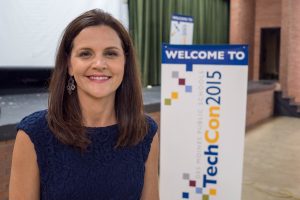Office of Innovation: At the Juncture of Education and Technology

Holly Crandell, currently the interim Chief Academic Officer at DMPS, will direct the new Office of Innovation.
On Monday morning – the second official day of summer – hundreds of educators filed in to Hoover High School. They were there for TechCon 2015, a two-day professional development conference on how technology and education go hand-in-hand.
With workshops on topics ranging from blended learning to GoMath and from Twitter to Skype, teachers are making the extra effort to find out how the smart use of technology will contribute to success for students.
This week’s first-even TechCon reflects a bigger step Des Moines Public Schools is taking to further its vision of being the nation’s model for urban education: creating the Office of Innovation.
Beginning July 1, this team will focus its work on the critical junction where innovation, technology and education meet. The new Office of Innovation will promote a vision for the integration of technology into the curriculum, learner-centered decision-making and ubiquitous access to digital resources. Initiatives will include working with teams of teachers to develop technology-rich lessons that align to curriculum standards and the development of an integrated coaching model that ensures a consistent approach for all training utilizing common materials.
Holly Crandell, currently the district’s interim Chief Academic Officer, will assume leadership of the Office of Innovation. Having led many successful systems-level initiatives within the Office of Academics, she is uniquely qualified to provide the exemplary leadership needed for the successful implementation, integration, and utilization of the IT Blueprint in order to provide all DMPS students with 21st century learning skills and a 21st century educational process.
Crandell points to a quote in the district’s IT Blueprint that eloquently describes the mission of the Office of Innovation: “Technology and data alone will not transform schools, rather schools must be comprehensively and systematically transformed in order to improve student learning and make effective use of technology and data.”
Joining Crandell, two experienced Directors will transition to this new Office: Carlyn Cox, who will serve as Director of Digital Learning, and Mary Grinstead, who will be the Director of Research and Data Management.
Noelle Tichy will become the Executive Director of Teaching & Learning, continuing her current work as well as assuming Carlyn Cox’s previous position as the important curriculum and instructional work of the Office of Academics continues.
Among the key initial areas of focus for the Office of Innovation include:
- support and implement blended and online learning;
- improve systemization of data collection and distribution;
- enhance digital content and library services.
The Office of Innovation will also work on the expansion of network infrastructure throughout the school district and in the community as well as the deployment of mobile end-user devices to students and teachers.
DMPS has been actively working with the Center for Educational Leadership and Technology (CELT) from Boston, MA to create an Information Technology (IT) Blueprint. The IT Blueprint, presented earlier this year to the School Board, will provide the way forward for this initiative. (Click here for more information on DMPS and CELT.)
“We have made tremendous progress in our school improvement systems over the last four years. We have also made a tremendous investment in technology systems. Personalized learning is our next big step forward to improve results for students. Our work on Standards-Referenced Grading has laid that foundation; we now need to dramatically improve our use of data, our utilization of technology, and transform our libraries and curriculum resources in service of personalized learning for our more than 32,000 students. The Office of Innovation will lead our efforts in this critical next phase in our evolution,” said Superintendent Thomas Ahart.
DMPS is committed to the full integration of technology to create new opportunities for differentiated instruction. Technology has dramatically changed the ability to personalize learning through the flexible delivery of instruction and assessment, and creates innovative opportunities for exploratory and project-based learning within and beyond the classroom. A commitment to the IT Blueprint represents a focused approached to continuous improvement over the next 3-5 years.
Throughout the year, the Office of Innovation will be providing additional information and updates regarding our DMPS IT Blueprint and the evolution of this new district office.




